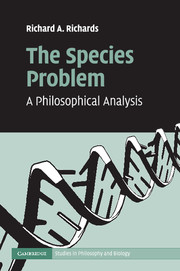Book contents
- Frontmatter
- Contents
- Acknowledgments
- 1 The species problem
- 2 The transformation of Aristotle
- 3 Linnaeus and the naturalists
- 4 Darwin and the proliferation of species concepts
- 5 The division of conceptual labor solution
- 6 Species and the metaphysics of evolution
- 7 Meaning, reference and conceptual change
- 8 Conclusion
- Bibliography
- Index
4 - Darwin and the proliferation of species concepts
Published online by Cambridge University Press: 04 April 2011
- Frontmatter
- Contents
- Acknowledgments
- 1 The species problem
- 2 The transformation of Aristotle
- 3 Linnaeus and the naturalists
- 4 Darwin and the proliferation of species concepts
- 5 The division of conceptual labor solution
- 6 Species and the metaphysics of evolution
- 7 Meaning, reference and conceptual change
- 8 Conclusion
- Bibliography
- Index
Summary
THE DARWINIAN SPECIES PARADOX
The species problem we have today looks a lot like the problem that confronted Darwin, but with one major difference. The modern problem is informed by Darwin's theory of evolution and recent developments of that theory. Yet it is nonetheless difficult to pin down precisely what Darwin directly contributed to the species debate. In part this is because it is difficult to pin down Darwin's views about the nature of species. In his published work, notebooks and correspondence, he wrote many seemingly inconsistent things about species. Consequently there is little consensus among historians and philosophers about his views. Some read Darwin as a species nominalist, believing that there are no species, only individual organisms. Species taxa are then nothing more than convenient ways of grouping organisms, and do not represent real things in nature. Others similarly read Darwin as a conventionalist, believing that species are just what competent naturalists identify as species. Yet others read him as accepting the reality of species taxa, but denying the reality of the species category. Still others read him as a full-blooded realist, accepting the reality of both species taxa and the species category.
This conflict in interpretation is largely due to a genuine paradox in Darwin's views. The title and contents of his most famous book, On Origin of Species, seem to presuppose the reality of species.
- Type
- Chapter
- Information
- The Species ProblemA Philosophical Analysis, pp. 78 - 112Publisher: Cambridge University PressPrint publication year: 2010



